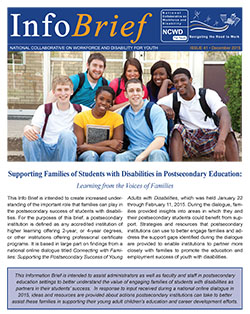The IEL-led National Collaborative on Workforce and Disability for Youth recently released an Info Brief entitled “Supporting Families of Students with Disabilities in Postsecondary Education.”
Postsecondary institutions have long worked with students to be independent and responsible for their own lives and education, rather than falling back on parents to be their advocates. But making that happen is a difficult process. Young people still rely very much on their family. And students with disabilities may have additional concerns or needs colleges are not good at addressing, concerns or needs that families can help with.
To begin to broach this issue, in January and February of 2015, the U.S. Department of Labor held an online dialogue with family members of postsecondary students with disabilities.
“My son has found professors at the college level to be very much less considerate of the students in his class who may have disabilities,” said one parent.
“Students don’t suddenly become able to communicate and plan well just because they turn 18, or just because they finish high school,” said another participant in the online dialogue. “Postsecondary schools need to find a path through the legal jungle to allow parents (or other advocates) to participate in planning courses; registering; planning and implementing accommodations; and asking questions. Banning the parent from the process is a dangerous idea and often places roadblocks in the student’s way that didn’t need to be there.”
 Based on the online dialogue, the IEL-led National Collaborative on Workforce and Disability for Youth (NCWD/Youth) recently released an Info Brief entitled “Supporting Families of Students with Disabilities in Postsecondary Education: Learning from the Voices of Families.” The brief is meant to assist administrators, faculty, and staff in postsecondary education to better understand the value of engaging families of students with disabilities as partners.
Based on the online dialogue, the IEL-led National Collaborative on Workforce and Disability for Youth (NCWD/Youth) recently released an Info Brief entitled “Supporting Families of Students with Disabilities in Postsecondary Education: Learning from the Voices of Families.” The brief is meant to assist administrators, faculty, and staff in postsecondary education to better understand the value of engaging families of students with disabilities as partners.
Some themes covered in the brief include ensuring that postsecondary supports do not focus solely on academics; using peer mentoring to support student success; improving coordination between secondary, postsecondary, and workforce settings; using assistive technology to improve the learning process; and helping young people build self-advocacy skills.
